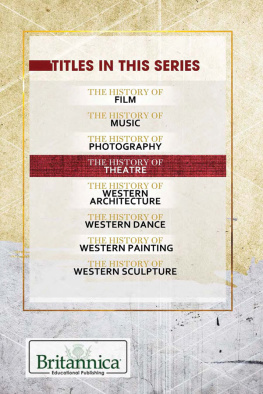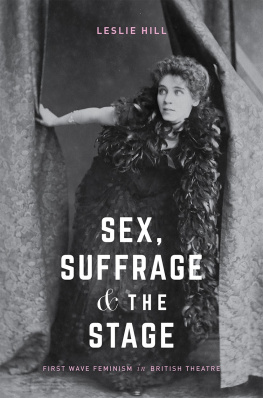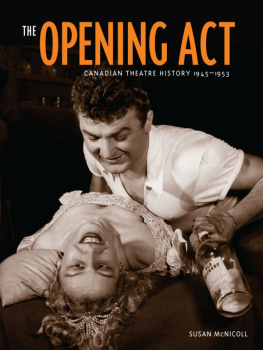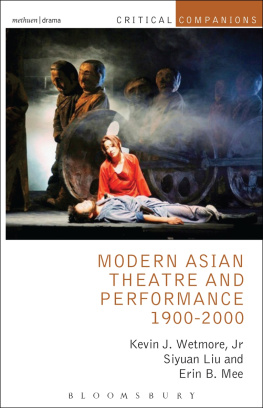
Stages of Engagement
Stages of Engagement is a compelling and wonderfully varied account of the relationship between theatre in the United States and the social, cultural, and political forces that shaped it during one of the most formative periods in the nations history.
Joshua E. Polster applies key thematic perspectives Colonialism, Religion, Race and Ethnicity, Gender and Sexuality, Economic Systems, and Systems of Government to seminal moments in US history. In doing so he explores the ways in which the theatre has responded to these turning points, through the work of some of its principal dramatists, directors, designers, and theatre companies. His approach tackles questions such as:
How did the plays of this period reflect the nations concerns and anxieties?
How did theatre, culture, and politics interconnect as the United States took to the world stage?
Which critical viewpoints are most useful to us when examining these cultural phenomena?
How did performances and productions in turn influence their audiences social and civic engagement?
On its own, or in tandem with its companion volume The Routledge Anthology of US Drama 18981949, this is the ideal text for any course in US Theatre. By examining each cultural moment from a range of critical perspectives and drawing upon a diverse range of sources, it is designed specifically for todays interdisciplinary and multicultural curriculum.
Joshua E. Polster is Associate Professor of Theatre at Emerson College. His publications include Reinterpreting the Plays of Arthur Miller, a critical edition of Millers A Memory of Two Mondays, and The Routledge Anthology of US Drama 18981949.
Stages of Engagement
US Theatre and Performance 18981949
Joshua E. Polster
First published 2016
by Routledge
2 Park Square, Milton Park, Abingdon, Oxon OX14 4RN
and by Routledge
711 Third Avenue, New York, NY 10017
Routledge is an imprint of the Taylor & Francis Group, an informa business
2016 Joshua E. Polster
The right of Joshua E. Polster to be identified as author of this work, and of the contributors for their individual chapters, has been asserted in accordance with sections 77 and 78 of the Copyright, Designs and Patents Act 1988.
All rights reserved. No part of this book may be reprinted or reproduced or utilized in any form or by any electronic, mechanical, or other means, now known or hereafter invented, including photocopying and recording, or in any information storage or retrieval system, without permission in writing from the publishers.
Trademark notice: Product or corporate names may be trademarks or registered trademarks, and are used only for identification and explanation without intent to infringe.
British Library Cataloguing-in-Publication Data
A catalogue record for this book is available from the British Library
Library of Congress Cataloging-in-Publication Data
1. Theater and society--United States--History--20th century. 2. American drama--20th century--History and criticism. 3. Social problems in literature. 4.
Politics in literature. I. Title.
PN2266.3.P75 2015
792.09730904--dc23
2015019527
ISBN: 978-1-138-01833-4 (hbk)
ISBN: 978-1-138-01834-1 (pbk)
ISBN: 978-1-315-66764-5 (ebk)
Typeset in Times
by Saxon Graphics Ltd, Derby
For Kimberly, who always believes
Contents
PART I
Colonialism
PART II
Religion, Race, and Ethnicity
STUART J. HECHT
PART III
Gender and Sexuality
SUSAN C. W. ABBOTSON
PART IV
Economic Systems and Systems of Government
JAMES FISHER
I would like to thank the wonderful reference assistants at the Buffalo Bill Center of the West, the Iwasaki Library at Emerson College, and the Beebe Library in Wakefield, Massachusetts; William Condee, Barry Witham, Odai Johnson, Sarah Bryant-Bertail, Stephen Marino, Brenda Murphy, and Melia Bensussen for their years of support and guidance; as well as Ben Piggott and Routledge for their excellence and encouragement. I am also indebted to the many artists, critics and scholars used in this book. A special thank you goes to Stuart Hecht, Susan Abbotson, and James Fisher for their admirable work in this project.
Stages of Engagement: US Theatre and Performance 18981949 features major sociopolitical and artistic forces that helped define the nation and its theatre in a period of unprecedented strength and strife. It covers a selection of the leading US theatre movements, organizations, practitioners, plays, productions, and performative events, which significantly illuminated and engaged in the principal controversies and events that helped give shape to the country as it emerged as a dynamic and divergent political, economic, military, and cultural power. The book analyzes various primary and secondary sources, representative plays and productions, theatre iconographies and personalities, as well as criticism, scholarship, and historical and theoretical approaches to explore the essential ways theatre engaged in the national debates of the period.
It is the intention of this book to demonstrate the vital and volatile relationship between US theatre and society, culture and politics, in order to show how theatre has been used as a means to cultivate better informed and engaged citizens, and to enact social change. At the same time, the book examines the rich and diverse cultures in the United States during the early twentieth century to study the various theatre cultures operant in US society.
However, it is not the purpose of this book to measure the degree of theatres impact on society, which would be a difficult if not impossible exercise. Few theatrical productions have overt examples of how much they have helped to instigate sociopolitical change, but change nonetheless occurs. For instance, it is known that Lillian Hellmans Watch on the Rhine helped to encourage an international alliance against fascism during World War II,1 and that, much later, The Laramie Project aided the passage of the hate crimes legislation. Great change can occur internally as well as externally, as it undoubtedly did to the weeping audiences of the premiere production of Arthur Millers Death of a Salesman.2 Moreover, not all political theatrical productions, on a large public scale, are successful in affecting societal laws or conduct, but that does not imply that the plays themselves are any less political. For instance, one should not dismiss Waiting for Lefty as an anemic political play because it failed to start a communist revolution in the United States. This book is more concerned with recording how theatre engaged with its times and participated in the struggle to educate and activate its audiences on significant social issues.
The rationale for covering the period from 1898 to 1949 is that there was an abrupt change in US culture, starting with its involvement in the Cuban War of Independence (18958), a change discernible in its theatrical productions and performances. At the turn of the twentieth century, the United States emerged as a significant global power as it dealt with imperialism, industrialism, capitalism, massive waves of immigration, and political movements such as US communism, feminism, and isolationism. It is during this period that US theatre became increasingly distinct from European models, as it more profoundly reflected its own unique society, style, and cultural concerns. There is also an abrupt change in US history and theatre shortly after World War II as the country transitioned into the Cold War and the postwar avant-garde movement. This study uses these bookends the years leading into the SpanishAmerican War (1898) and the years shortly after World War II to help define the major moments when the United States came forth as a principal player on the world stage and developed a more distinct culture at home. The years between 1898 and 1949 are also a prominent period in US culture when theatre played a more essential and communal role. It was more integrated and engaged in society, as were its citizens, prior to the post-World War II rise of television broadcasting and ownership that helped create a more disengaged and private culture.












